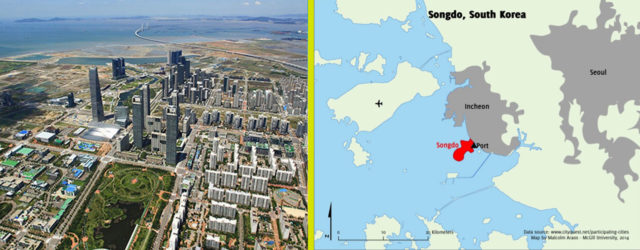South Korea Conceptualizes the Ultimate Smart City
December 28, 2014 — Blog
Songdo International Business District is conceptualized as the ultimate smart and sustainable city and a testing ground for leading-edge technological infrastructure by Cisco Systems; all dimensions of life are integrated: real estate, utilities, transportation, education, health and government.
Built on tidal flats, 64 km from Seoul within the Incheon Free Economic Zone (IFEZ), South Korea’s first FEZ, and connected to Incheon International Airport by a 12 km bridge, Songdo differentiates itself from previous new towns in and around Seoul, which were public sector developments.
One of the key draws of Songdo is its strategic location in the Northeast Asian trading hub, which means residents can reach one third of the world’s population within 3.5 hours.
We want to crack the code of urbanism, then replicate it. We want to build at least twenty Songdos ourselves: the G20 – Gale 20. – Stanley Gale, CEO, Gale International, in ‘Metropolis Now’, Wallpaper, 2010

Key Facts
Date: 2003-2020
Intended population: 252,000 (with 300,000 – 400,000 commuters)
Size: 86 square kilometers, business district 9.3 square kilometers
Estimated cost: USD $40 billion
Financing strategies: The project is a joint venture between the City of Incheon, Gale International (61%), POSCO E&C (30%), and Morgan Stanley Real Estate (9%). Stanley Gale, the developer, has invested $100 million of his own money. Asia Development institute, Arup & Partners, and CISCO Services Korea are also key investors.
Planners / contractors: The initial primary designer was OMA but is currently Kohn Pedersen Fox (KPF, New York), along with Kunwon architects, Heerim, Yooshin, John Portman & Associates and Gansam Partners. MVRDV (Netherlands) and REX (U.S.) have also contributed to the planning and design of the city. The master plan of Songdo International Business District was developed by NSIC, which is co-led by Gale International and the Posco Group.
Environmental and sustainability strategies: Songdo has been built using a number of strategies designed to minimize its ecological impact by limiting damage to the environment and by achieving energy independence as much as possible.
- Both Korean standards and LEED certification have been employed in all major buildings.
- The central pneumatic waste disposal system eliminates the need for garbage pick-up.
- Low U value windows are used in buildings as well as LED lights, a water-cooled air conditioning system, and solar energy, which reduces energy consumption in each building by 30%.
- There are 25 km of bike paths, extensive walking paths, and 40% green space.
- The city is built around a ‘central park’ that uses indigenous plants.
- Songdo builds upon the principles of New Urbanism, Smart Growth, Transit Oriented Development and Green Growth.
- Charging stations for electric vehicles are provided throughout the city.
Industries: The city will have four universities and will host professional development programming for local corporations. As a designated Free Economic Zone, Songdo seeks to attract banks, multinational and domestic corporations to its international business district.
Precedents: The designers of Songdo have drawn inspiration from a number of cities and sought to reproduce what they view as successful urban features, such as New York’s Central Park and the canals systems of Venice. These and other social and recreational spaces from around the world are intended to draw upon the wisdom of the past and add complexity and texture to a brand new city.
Attractivity: Songdo is designed to respond to the overcrowded and expensive conditions in Seoul by providing a comfortable place for international business people and their families. Policies to attract residents and businesses include:
- Significant economic incentives to attract foreign investment.
- E-government intended to streamline civil services.
- International schools (70% foreign, 30% Korean), including Songdo Global University and foreign medical facilities.
- Incentives for technology companies, such as tax reduction on royalties, tariff reductions, high-speed wireless, and the ability to access personal data throughout the city.
- Tax incentives for dividends of foreign investors, and income tax exemption for non-Koreans.
Local challenges:
- While Songdo’s proximity to Seoul is an advantage for business and commuters, it also presents a danger of becoming a bedroom community, as has been the fate of many other new towns in the Seoul area. At present, occupancy rates are lower than expected so the city feels rather empty.
- Songdo is a destination for migratory birds, and has faced challenges balancing its sustainable development goals with environmentalists’ calls for preserving bird habitats. While the city aims to be ‘green’, any development alters the natural environment.
Access the report from Cityquest – KAEC Forum 2013 here.